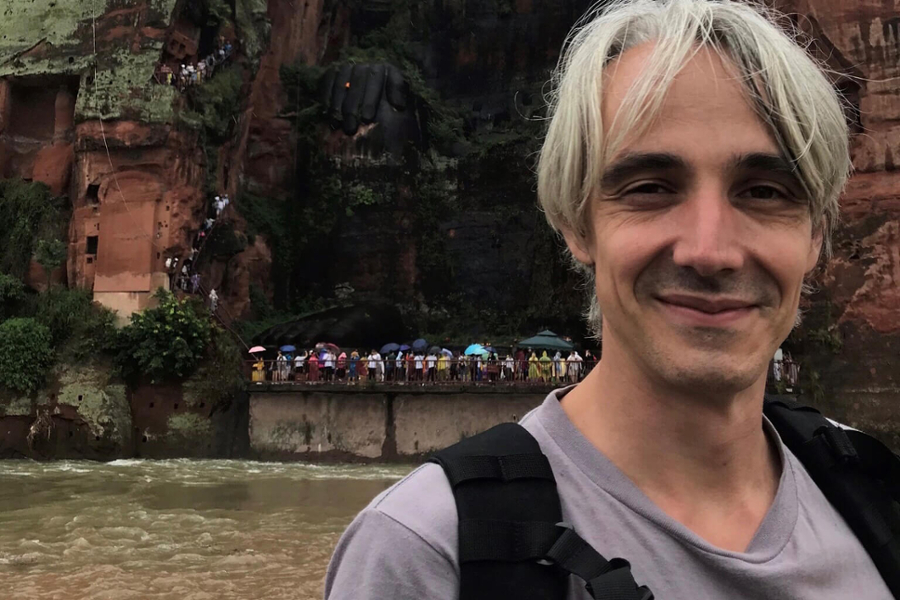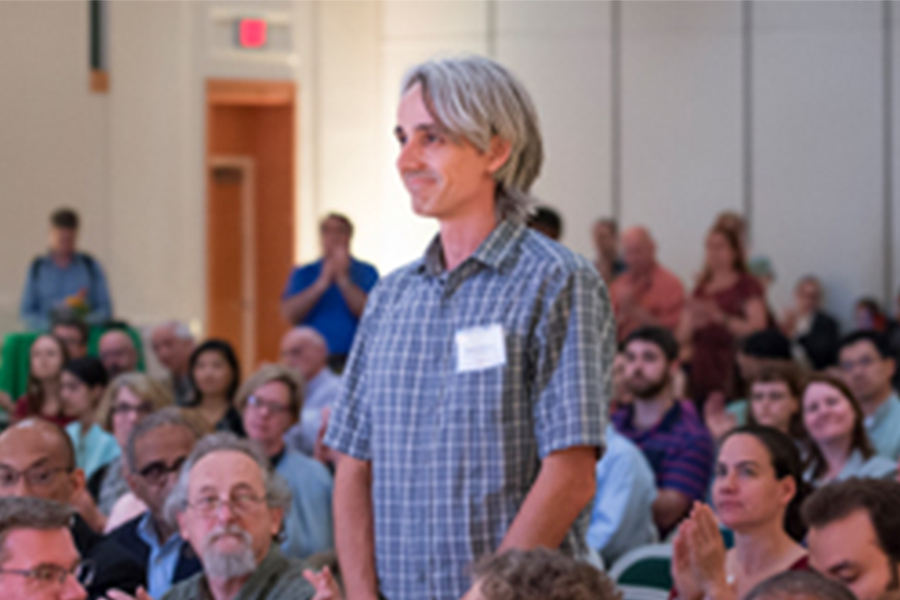
Kindness, Enthusiasm Matter to Popular Physics Professor
By Kelly Saavedra
When David Anderson’s mother first explained to him Einstein’s theory of special relativity, she may as well have been telling a child there's no Santa Claus.
“I was so outraged!” said Anderson, who now finds his youthful reaction amusing. “I recall walking on the beach with my family, and my mother, who has an undergraduate math degree, was telling me time wasn’t what I thought it was, that it wasn’t universal. Time was relative. It went against my common sense! I almost didn’t believe her! It really sparked something in me, and I wanted to learn more.”
Anderson has been teaching physics at CMU since 2008. He’s a favorite among CMU students, who are often caught by surprise when he levitates a magnet to demonstrate the Meissner effect, or when he nearly falls off a spinning stool holding two dumbbells to show what is meant by conservation of angular momentum.
But much like his entertaining science demonstrations in class, there is more to good teaching than meets the eye.
“I don’t think any of us are formally trained to teach at the college level. So, how did I learn how to teach? I borrowed from the best teachers I knew,” he said.
Thinking back to his own undergraduate education, he began by trying to emulate his best professors. He also learned a great deal about teaching from two of his CMU colleagues, Barry Luokkala and Roy Briere, and from reading books written by renowned physicists like Richard Feynman, perhaps best known to a general audience for investigating what caused the Space Shuttle Challenger disaster.
“There is a basic instruction by Isaac Newton, ‘If I have seen further it’s by standing on the shoulders of giants,’” Anderson said. “If I am any sort of a good teacher it’s for similar reasons, standing on the shoulders of giants.”
Anderson believes having enthusiasm for the subject is paramount. He also lives by the philosophy that a little kindness goes a long way, and that applies not only to others but to yourself as well.
“I had no idea what I wanted to be when I grew up. It actually was a source of anxiety when I was young. I remember my father saying, ‘You really shouldn’t worry too much,’ and I try to give that advice to my students as well, who sometimes get so caught up in what’s next that they forget to live in the present,” he said. “Focus on where you are now. The journey is as important as the destination. If you’re a student, and you focus on understanding what you’re learning, the grades will follow automatically and you’ll end up in a good place.”
"Focus on where you are now. The journey is as important as the destination."
Office hours are Anderson’s favorite part of the job, and what he’s been missing most in the pandemic.
“One of the nicest things is when a student ‘gets it’ and I feel like I’ve been successful at teaching,” he said. “In classes as large as 200, it’s hard to get a sense of whether they’re following me or not. So those face-to-face conversations, even in the corridors before and after class, are really very meaningful in the long run.”
Beyond the direct interaction with students, Anderson puts forth great effort behind the scenes in structuring the course, producing an online learning management system, making sure courses fit properly together, making sure his "small army" of teaching assistants are all on the same page, and the sheer management aspect of it all.
Anderson also serves on a number of committees, the most important of which he considers to be the Undergraduate Curriculum Committee in the Physics Department.
“Physics is changing all the time. There are new topics, new techniques,” he said. “We are constantly reviewing the curriculum and making sure our students are as well prepared as possible for whatever is the next phase in their life, whether that’s graduate school, or industry, or applying those physics skills to data science, finance, or some other field of their choosing."
Anderson was recognized in 2017 with the Julius Ashkin Award for his outstanding devotion to teaching.
